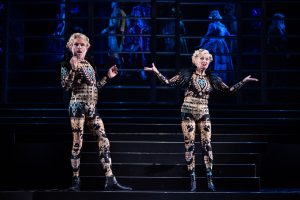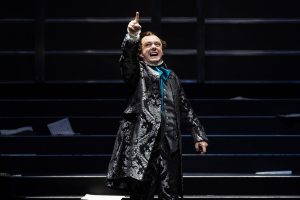Concert Hall, December 30
8/10

Having played Mozart in London and New York in 1999, Michael Sheen now slides into the sleeves and trousers of Salieri so completely that he disappears. The Welsh actor famed for playing Tony Blair or Bill Masters is nowhere to be seen; just the poisonous stew of jealousy, hate and fawning mediocrity that is Antonio Salieri, court composer to Holy Roman Emperor Joseph II.
The masterstroke of Peter Shaffer’s 1979 play was making artistic envy as toxic and all-consuming as to rival the sexual jealousy of Othello. Unlike the court and public, Salieri, the leading composer of his day, knows deep in his bowels that Mozart’s music is infinitely superior to his own. In his scheme of things, it is touched by God, when he’s prayed to be God’s voice on earth, himself, and had dared to think he was. But what he now hears is revelatory for a mind already straitjacketed into that mediocrity.

The challenge for the Salieri actor is that we need to care about his predicament, rather than putting all our sympathetic eggs in Mozart’s basket, or that of his wife, Constanze. Sheen more than meets this challenge. He gives us a Salieri so full and rounded that we almost resent the upstart Mozart ourselves; that we hang off every word, even though – in a triumph of the most delicious dramatic irony – we know most of what escapes Salieri’s lips is twisted and fabricated. Sheen has the cadences of his lines so finely tuned that you seem to physically sit forward to grasp it all as he maximises the meaning of each syllable (not to mention the wit) without ever straining for effect.

His performance crowns a hugely ambitious show directed by Craig Ilott for Red Line Productions, a company which apparently can vault from the tiny Old Fitz Theatre to the Opera House’s Concert Hall in a single bound. Audaciously using this vast room for a play constitutes part of the Opera House’s 50th birthday celebrations, and while you won’t see much in the way of facial expressions from the circle or even the back of the stalls, the production fully justifies the eccentric choice of venue. The amplified sound (masterminded by Tony David Cray) is sensational, and the scale of the show, with about 40 actors, musicians and singers, plus Michael Scott-Mitchell’s deep-perspective set, certainly creates a space-filling spectacle. This is further amplified by the wow-factor costumes of Anna Cordingley and Romance Was Born, which bubble and froth like garish, fizzing cocktails, or like 18th-century dress seen through a hallucinogenic kaleidoscope.

The characters of Salieri, Mozart and Constanze should, however, be in an odd sort of balance: a scalene triangle, if the like, with Salieri the longest side. But Rahel Romahn (Mozart) and Lily Balatincz (Constanze) simply can’t match Sheen’s firepower or conviction, and so the tension and energy drop when Sheen is absent from a scene. It’s not that Romahn and Balatincz are bad; it’s that Sheen is simply operating on a level they cannot yet attain. Had Ilott found actors to match his star, this would be a five-star review.
The live music, directed by Sarah-Grace Williams, endlessly intensifies the production’s visual sumptuousness and vivacity, especially when Salieri offers his running commentaries on Mozart’s genius as the excerpts are played. The supporting cast also excels, led by Toby Schmitz as the fey, detached emperor, and including Belinda Giblin and Josh Quong Tart as the two Venticelli, Salieri’s eyes and ears at court.